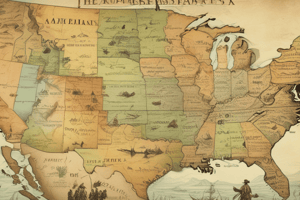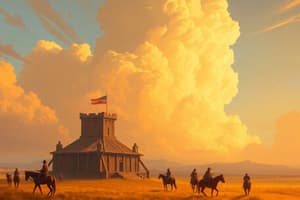Podcast
Questions and Answers
What economic factors motivated westward expansion?
What economic factors motivated westward expansion?
- Need for military alliances
- Search for land, resources, and economic opportunities (correct)
- Desire for education and cultural development
- Pursuit of artistic inspiration
How did Romanticism in art contribute to migration to the west?
How did Romanticism in art contribute to migration to the west?
- By focusing on historical events
- By emphasizing nature and individualism (correct)
- By celebrating war and conquest
- By promoting urban living and industrial growth
What was the Democratic Party's position on westward expansion?
What was the Democratic Party's position on westward expansion?
- In favor only if it involved economic alliances
- Supportive of expansion, particularly into new territories (correct)
- Indifferent to the issue of expansion
- Opposed to all forms of expansion
What key action did President James K. Polk take following his election in 1844?
What key action did President James K. Polk take following his election in 1844?
What did the Wilmot Proviso propose, and why was it significant?
What did the Wilmot Proviso propose, and why was it significant?
What was the main outcome of the Kansas-Nebraska Act?
What was the main outcome of the Kansas-Nebraska Act?
What event is referred to as 'Bleeding Kansas'?
What event is referred to as 'Bleeding Kansas'?
What was the main issue addressed in the Dred Scott case by the Supreme Court?
What was the main issue addressed in the Dred Scott case by the Supreme Court?
What did the court aim to achieve by declaring that African Americans were not citizens?
What did the court aim to achieve by declaring that African Americans were not citizens?
How did abolitionists differ from anti-slavery/free soil advocates?
How did abolitionists differ from anti-slavery/free soil advocates?
What major political change occurred in the 1850s and 1860s regarding political parties?
What major political change occurred in the 1850s and 1860s regarding political parties?
What position did Abraham Lincoln take regarding the expansion of slavery in the 1860 presidential election?
What position did Abraham Lincoln take regarding the expansion of slavery in the 1860 presidential election?
What does the phrase 'Draw a line. Work out a solution. End the quarrel.' signify in the context of pre-Civil War slavery negotiations?
What does the phrase 'Draw a line. Work out a solution. End the quarrel.' signify in the context of pre-Civil War slavery negotiations?
What was the immediate political consequence of the Caning of Charles Sumner?
What was the immediate political consequence of the Caning of Charles Sumner?
What was the rationale for Southern leaders' secession after Lincoln's election?
What was the rationale for Southern leaders' secession after Lincoln's election?
What was one motivation common to both Confederate and Union soldiers during the Civil War?
What was one motivation common to both Confederate and Union soldiers during the Civil War?
What limited impact did the Emancipation Proclamation have on enslaved people?
What limited impact did the Emancipation Proclamation have on enslaved people?
Why did President Lincoln refuse to recognize the Confederacy as a separate nation?
Why did President Lincoln refuse to recognize the Confederacy as a separate nation?
What did 'hard war' entail during the Civil War?
What did 'hard war' entail during the Civil War?
How did Lincoln's approach to Reconstruction differ from that of the Radical Republicans?
How did Lincoln's approach to Reconstruction differ from that of the Radical Republicans?
What was the primary role of the Freedmen's Bureau during Reconstruction?
What was the primary role of the Freedmen's Bureau during Reconstruction?
What were 'Black Codes' intended to achieve in the post-Civil War South?
What were 'Black Codes' intended to achieve in the post-Civil War South?
What issue led to Andrew Johnson's impeachment?
What issue led to Andrew Johnson's impeachment?
How was Rutherford B. Hayes declared the winner of the 1876 election?
How was Rutherford B. Hayes declared the winner of the 1876 election?
Flashcards
Wilmot Proviso
Wilmot Proviso
A proposal to ban slavery in territories gained from Mexico, increasing tensions over slavery.
Compromise of 1850
Compromise of 1850
A series of laws to address the issue of slavery in newly acquired territories. Key aspects included California's admission as a free state and a stricter Fugitive Slave Act.
Fugitive Slave Act of 1850
Fugitive Slave Act of 1850
A law requiring the return of escaped slaves to their owners.
Popular Sovereignty
Popular Sovereignty
Signup and view all the flashcards
Bleeding Kansas
Bleeding Kansas
Signup and view all the flashcards
Dred Scott case
Dred Scott case
Signup and view all the flashcards
Kansas-Nebraska Act
Kansas-Nebraska Act
Signup and view all the flashcards
Mexican-American War causes
Mexican-American War causes
Signup and view all the flashcards
Chief Justice's Opinion in Slavery Case
Chief Justice's Opinion in Slavery Case
Signup and view all the flashcards
Abolitionists vs. Anti-Slavery
Abolitionists vs. Anti-Slavery
Signup and view all the flashcards
Political Party Changes (1850s-1860s)
Political Party Changes (1850s-1860s)
Signup and view all the flashcards
1860 Presidential Candidates' Positions
1860 Presidential Candidates' Positions
Signup and view all the flashcards
"Draw a line...end the quarrel" (Pre-Civil War)
"Draw a line...end the quarrel" (Pre-Civil War)
Signup and view all the flashcards
Caning of Charles Sumner
Caning of Charles Sumner
Signup and view all the flashcards
Lincoln's 1860 Election and Secession
Lincoln's 1860 Election and Secession
Signup and view all the flashcards
Southern Secession Justification
Southern Secession Justification
Signup and view all the flashcards
Union vs. Confederate Soldier Motives
Union vs. Confederate Soldier Motives
Signup and view all the flashcards
Black Men's Appeal to Military Service
Black Men's Appeal to Military Service
Signup and view all the flashcards
Emancipation Proclamation's Scope
Emancipation Proclamation's Scope
Signup and view all the flashcards
Lincoln's Rejection of Confederacy as Nation
Lincoln's Rejection of Confederacy as Nation
Signup and view all the flashcards
Hard War Tactics
Hard War Tactics
Signup and view all the flashcards
Union vs. Confederate Military Advantages
Union vs. Confederate Military Advantages
Signup and view all the flashcards
Lincoln's Reconstruction Approach
Lincoln's Reconstruction Approach
Signup and view all the flashcards
Study Notes
Economic Factors of Westward Expansion
- Economic opportunities like farming and mining fueled westward expansion.
- The pursuit of land and resources was a key motivator.
Romanticism and Westward Migration
- Romanticism's emphasis on nature and individualism highlighted the westward journey as a pursuit of freedom.
Party Positions on Expansion
- Democrats supported expansion.
- Whigs were more cautious, sometimes opposed.
Election of 1844 and Expansion
- James K. Polk's victory led to efforts for Texas annexation and expansion in Oregon and California.
Causes of the Mexican-American War
- Border disputes over Texas.
- US expansionism.
- Mexico's refusal to negotiate.
Lincoln's "Spot Resolutions" and Opposition to War
- Lincoln questioned the justification for the war, reflecting anti-war sentiment.
Thoreau's Protest of the Mexican War
- Thoreau protested the war by refusing to pay taxes and writing "Civil Disobedience."
Wilmot Proviso and Slavery Debate
- The Wilmot Proviso aimed to ban slavery in territories from Mexico, increasing sectional tensions.
Compromise of 1850
- California's admission as a free state.
- A stricter Fugitive Slave Act.
- Popular sovereignty in other territories.
Fugitive Slave Act and Northern Opinion
- The act required returning escaped slaves, strengthening anti-slavery sentiment in the North.
Southern California Migrants and Slavery
- Southern gold-seekers in California opposed statehood as free to avoid weakening Southern political power.
Kansas-Nebraska Act
- Popular sovereignty determined whether Kansas and Nebraska would permit slavery.
Popular Sovereignty
- Popular sovereignty allowed residents of a territory to decide on the issue of slavery.
Bleeding Kansas and John Brown
- Violent conflict over slavery in Kansas.
- John Brown led anti-slavery attacks in the region.
John Brown's Attack on Harper's Ferry
- Brown attacked the federal armory to incite a slave rebellion.
Dred Scott Supreme Court Decision
- The court ruled against Dred Scott's citizenship and declared the banning of slavery in territories unconstitutional.
- The court aimed to resolve the slavery issue.
Abolitionists vs. Free-Soil Advocates
- Abolitionists sought to end slavery everywhere.
- Free-soilers opposed its expansion but not outright abolition.
Political Party Changes
- The Whig Party dissolved.
- The Republican party emerged against slavery's expansion.
1860 Presidential Candidates' Positions
- Lincoln: Opposed slavery expansion.
- Douglas: Supported popular sovereignty.
- Breckenridge: Supported slavery expansion.
- Bell: Sought to preserve the Union without a strong stance on slavery.
Pre-Civil War Slavery Approach
- The approach to slavery was about drawing lines, working out solutions, and ending conflict.
- Examples were the Missouri Compromise and Compromise of 1850.
Caning of Charles Sumner
- Sumner was attacked by Brooks in Congress.
- This increased sectional tensions and boosted the Republicans.
- The incident affected the 1856 presidential election.
Lincoln's Election and Secession
- Lincoln's election without Southern support led to Southern secession.
- This was a new development in the presidential elections of the period.
Southern Explanations for Secession
- The states argued for their right to secede to protect slavery and states' rights.
Confederate and Union Soldier Motives
- Both sides fought for their homes, duty, honor.
- Union soldiers were primarily about preserving the Union.
- Confederates fought for states' rights and slavery.
Black Men Joining the Union Army
- Joining the military gave Black men the chance for freedom and equality.
Emancipation Proclamation
- It freed enslaved people in Confederate states.
- It was limited, excluding border states for political reasons.
Lincoln's View of the Confederacy
- Lincoln maintained that the Confederacy was in rebellion.
- He didn't recognize the Confederacy as a separate country to prevent legitimizing secession.
Hard War Tactics
- “Hard war,” such as Grant and Sherman's, emphasized aggression and destruction to quickly end the conflict.
- This led to civilian suffering.
Union and Confederate Military Advantages
- The Union had more resources and manpower.
- The Confederacy had better military leadership and local knowledge.
Lincoln's Reconstruction Approach
- Lincoln aimed for a lenient approach to Southern reintegration.
- This clashed with Radical Republicans' harsher stance and President Johnson’s approach, which was similar to Lincoln's, but more flexible regarding southern autonomy.
Freedmen's Bureau
- The Bureau aided freedmen with education, healthcare, and legal services.
Andrew Johnson's Background
- Johnson, a Southern Democrat, was a former slave owner, unlike Lincoln's nationalistic stance.
Black Codes
- Black Codes were laws that severely limited Black Americans’ freedoms.
- Aims to maintain a labor force in the South, permitting work contracts yet forbidding land ownership and specific rights.
Tenure of Office Act and Impeachment
- This act restricted presidential power to remove officials without Senate approval, leading to Johnson's impeachment.
1876 Election and Resolution
- The election was contested, and the winner, Rutherford B. Hayes, was determined by a commission.
- This was due to widespread voter fraud and disputed results.
Studying That Suits You
Use AI to generate personalized quizzes and flashcards to suit your learning preferences.




